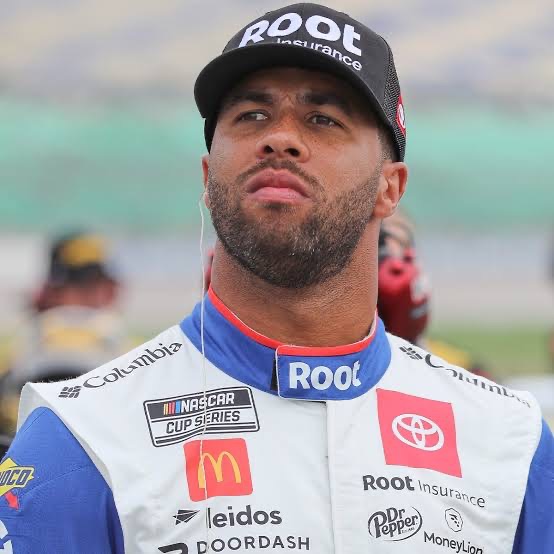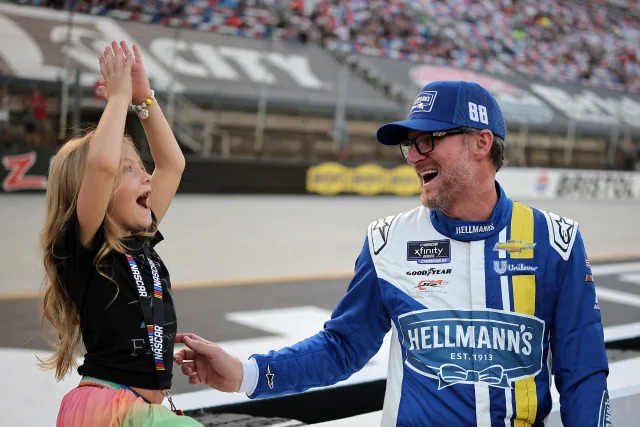Bubba Wallace has become one of the most polarizing figures in NASCAR, igniting passionate discussions about race, social justice, and the future of the sport. As the first African American driver to win a Cup Series race in almost 50 years, Wallace has undoubtedly made history, but his influence on NASCAR has extended far beyond the race track. While many applaud his courage to speak out on racial inequality and push for diversity in a traditionally white-dominated sport, others view him as a divisive figure who has shifted the focus of NASCAR away from its core values of competition and performance.
The Talladega Incident: A Turning Point
One of the most defining moments in Wallace’s career occurred in 2020 when a noose was discovered in his garage stall at Talladega Superspeedway. The incident was initially treated as a hate crime, drawing national attention and putting Wallace at the center of a heated debate on race and inclusivity in NASCAR. However, it was later revealed that the “noose” was actually a garage pull rope that had been in place long before Wallace’s arrival. Despite this clarification, the incident had already left its mark.
Many stood by Wallace, commending his courage in the face of what initially appeared to be a racially motivated act. NASCAR, fellow drivers, and public figures rallied around him, showing their support. However, a significant portion of NASCAR’s fanbase viewed the situation differently. Critics accused Wallace of blowing the incident out of proportion and using it to promote a narrative of victimhood, further stoking racial tensions within the sport. For these detractors, the incident reinforced their perception of Wallace as someone who brings race into NASCAR unnecessarily, shifting the spotlight away from racing itself.
Support for Black Lives Matter: Deepening the Divide
Wallace’s advocacy for racial justice did not stop with the Talladega incident. His vocal support for the Black Lives Matter movement further polarized opinions. On one hand, Wallace was praised for using his platform to address the lack of diversity and inclusivity in NASCAR. His support for social justice issues brought attention to the systemic barriers that had long kept minority drivers and fans on the margins of the sport. In many ways, Wallace became a symbol of progress, showing that NASCAR was not immune to the broader cultural conversations happening across the country.
However, for a large segment of NASCAR’s traditional fanbase, Wallace’s stance on social justice issues only deepened their frustration. For them, NASCAR had always been a place where the focus was on skill, speed, and competition, not politics. Wallace’s activism, they argued, detracted from what they loved most about the sport—watching talented drivers battle it out on the track. To these fans, Wallace’s actions had politicized NASCAR, turning it into a platform for social and racial debate instead of a sanctuary for pure racing.
Racing Accomplishments vs. Controversy
Despite the controversies surrounding him, Wallace’s racing career is not without merit. His win at Talladega in 2021 was a historic moment, marking him as the first African American driver to win a Cup Series race since Wendell Scott’s victory in 1963. This achievement cemented Wallace’s place in NASCAR history and showed that, when given the right equipment, he had the talent to compete at the highest level.
Supporters of Wallace often point to his racing accomplishments as evidence that his place in NASCAR is well-deserved. They argue that Wallace has faced unique challenges as a Black driver in a predominantly white sport, and his success on the track should be celebrated. Moreover, his presence in NASCAR has opened doors for other minority drivers, helping to create a more inclusive environment in a sport that has historically struggled with diversity.
Yet, for Wallace’s detractors, his success on the track is overshadowed by the controversies he has stirred off of it. In their eyes, Wallace’s constant focus on race has alienated long-time fans, creating an environment where NASCAR is no longer about talent and performance, but about identity politics. For these critics, Wallace’s role in NASCAR represents a departure from the sport’s traditional values, and they see him as a figure who has damaged the sport’s reputation by injecting unnecessary controversy.
Balancing Advocacy and Racing
The challenge for Wallace moving forward is how to balance his advocacy for social justice with his racing career. NASCAR, like many other sports, is grappling with issues related to race and inclusion, and Wallace’s role in addressing these topics is undeniably important. However, many fans feel overwhelmed by the constant focus on race, believing that it detracts from the competition they love.
One of the most significant criticisms of Wallace is his approach to dealing with his detractors. Rather than seeking to bridge the gap between his supporters and critics, Wallace often responds defiantly, labeling his critics as racists or bigots. While this may be a reflection of his personal experiences with discrimination, it has further deepened the divide among NASCAR fans. For those who view NASCAR as a meritocracy, where success is determined by skill and hard work, Wallace’s focus on race feels alienating, as if the sport is becoming more about external social issues than the action on the track.
The Broader Impact on NASCAR
The controversies surrounding Wallace have not only affected his own career but also had broader implications for NASCAR as a whole. NASCAR, which has spent years trying to shed its image as an insular, racially exclusive sport, now finds itself caught in the middle of a cultural tug-of-war. Some fans believe the sport is evolving in the right direction by embracing diversity, while others feel that the emphasis on race and politics has overshadowed the competition.
Ultimately, the question remains: Has Bubba Wallace’s impact on NASCAR been more positive or negative? For his supporters, Wallace is a hero who has pushed for necessary change in a sport that desperately needed it. For his critics, Wallace has become a symbol of controversy, someone who has shifted the focus of NASCAR away from its core values of competition and performance. As the debate continues, one thing is certain—Bubba Wallace’s legacy in NASCAR will be one of the most discussed and debated topics for years to come.




